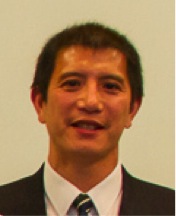Surachai Supattapone, MD, PhD

Title(s)
Professor of Biochemistry and Cell Biology
Professor of Medicine
Department(s)
Biochemistry and Cell Biology
Medicine
Education
Johns Hopkins University School of Medicine, Ph.D. 1992
Johns Hopkins University School of Medicine, M.D. 1992, Oxford University D.Phil. 1991
Programs
Molecular and Cellular Biology Graduate Programs
Molecular Pathogenesis Program
Neuroscience Center at Dartmouth
Websites
http:
http:
http:
http:
Academic Analytics
View Profile
Contact Information
Dartmouth Medical School
74 College Street
Vail Building Room 311
Hanover NH 03755
Office: 603-646-5212
Phone: 603-646-5213
Email: supattapone@dartmouth.edu
Professional Interests
Prion Diseases
Neurodegeneration
Protein Misfolding
Genome-wide CRISPR screens
Biography
Surachai joined the Dartmouth faculty in 2001, and has enjoyed teaching in the Year One Metabolism and Scientific Basis of Medicine courses for medical students, as well as the Core Course for Molecular and Cellular Biology graduate students. He has also greatly enjoyed having the opportunity to mentor students conducting laboratory research projects on the pathogenesis of prion disease. Surachai has also served as the Chair for the Molecular and Cellular Biology (MCB) Graduate Program, the director for the Clinical Translational Science Masters Program, a director for the Cellular and Molecular Basis of Disease course, and member of the Medical Education Committee and the Committee for Student Performance and Conduct. He has also served as a standing member of two NIH study sections. He has won teaching awards at Geisel and at the University of California at San Francisco, and been elected as a Fellow to both the American Society for Microbiology (ASM) and the American Association for the Advancement of Science (AAAS).
Anti-prion drugs do not improve survival in novel knock-in models of inherited prion disease. Correction: Emergence of Prions Selectively Resistant to Combination Drug Therapy. Anti-prion drugs do not improve survival in knock-in models of inherited prion disease. Cancer Epidemiology in the Northeastern United States (2013-2017). Phospholipid cofactor solubilization inhibits formation of native prions. Conformational diversity in purified prions produced in vitro. A single protective polymorphism in the prion protein blocks cross-species prion replication in cultured cells. Hydrogen Peroxide-induced Cell Death in Mammalian Cells. Alternating anti-prion regimens reduce combination drug resistance but do not further extend survival in scrapie-infected mice. SEC24A facilitates colocalization and Ca(2)(+) flux between the endoplasmic reticulum and mitochondria. |
|